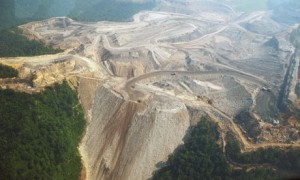
mountaintop coal mining operation in West Virginia. Photograph: Mandel Ngan/AFP/Getty Images
From Beth Wellington at the Guardian.
CNN correspondent Soledad O'Brien's recent piece on mountaintop removal (MTR) in the Appalachian mountains has the troubling title, "Steady job or healthy environment: what [sic] would you choose?"
How about we choose both?
In any case, MTR does not, despite industry claims, deliver employment to offset its environmental damage. It's simply a win-win for Big Coal and its political supporters, and a lose-lose for ordinary people who live inmining areas. Whatever the industry would have you believe, basing an economy on coal is not a sustainable development plan. A study by the Appalachian Regional Commission noted the effects of mining on employment in Central Appalachia:
"As employment in Central Appalachia's mining sector has declined over time…many counties that were already typically experiencing relatively poor and tenuous economic circumstances…have been unable to successfully adapt to changing economic conditions."
Michael Hendryx and Melissa M Ahern found similar results when they investigated the region: "The heaviest coal mining areas of Appalachia had the poorest socio-economic conditions."
In addition to the negative impact on employment, mountaintop removal has terrible effects on the land. Rob Goodwin of Coal River Mountain Watch recently said of the land around Southern Appalachia:
"Southern Appalachia is unique. Because there were no glaciers here, the topsoil is some of the oldest in the world and that's why there are ramps, ginseng and molly moochers [morels], among other valuable species. What you are doing here on this mine site is destroying the 10,000-year-old species that, regardless of what you do, will not grow back."
More.





